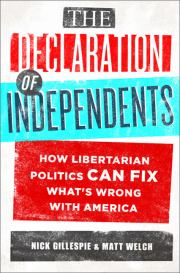 In their book The Declaration of Independents, Nick Gillespie and Matt Welch describe the Democratic and Republican parties as behaving like they are representing “interest groups.” One way to think of this is that the Democratic and Republican squabble with each other to fight over the resources of the citizens, hoping to distribute the spoils to the their respective constituencies in what is often zero-sum interaction (or negotiation), rather than working with each other (adversarially) to arrive at an optimal scenario (i.e. optimal for the country as a whole, though likely not optimal to either party individually), through non-zero-sum interaction. We’d obviously hope that they were doing the latter rather than the former.
In their book The Declaration of Independents, Nick Gillespie and Matt Welch describe the Democratic and Republican parties as behaving like they are representing “interest groups.” One way to think of this is that the Democratic and Republican squabble with each other to fight over the resources of the citizens, hoping to distribute the spoils to the their respective constituencies in what is often zero-sum interaction (or negotiation), rather than working with each other (adversarially) to arrive at an optimal scenario (i.e. optimal for the country as a whole, though likely not optimal to either party individually), through non-zero-sum interaction. We’d obviously hope that they were doing the latter rather than the former.
This recent debt ceiling deal seems to me to be a good example showing how the political parties behave like interest groups rather than adversarial cooperators. Here is how the White House website assures us that they have done a good thing by creating the “trigger” deficit cuts that will take place if some other agreement sufficient to cut the deficit by $1.2T is not reached:
If the fiscal committee took no action, the deal would automatically add nearly $500 billion in defense cuts on top of cuts already made, and, at the same time, it would cut critical programs like infrastructure or education. That outcome would be unacceptable to many Republicans and Democrats alike – creating pressure for a bipartisan agreement without requiring the threat of a default with unthinkable consequences for our economy.
So the White House propaganda is that we should be so proud of our leaders because they have established that, unless they are able to arrive at an agreement on the deficit, there will be a fallback scenario which both Republican and Democratic leaders think would be bad for the country. This is only something to be proud of if we regard Republicans and Democrats as akin to two kids fighting over a box of candy, who would both be happy to hear from their mother that no matter what happens, the other child will not be granted rights to the entire box.
Wouldn’t it be more comforting if they were issuing propaganda with exactly the opposite message? I.e.: “That [fallback] outcome would be acceptable to many Republicans and Democrats alike…” Yes, it would be, in a world where we actually trusted our politicians. But the reason they’d never say anything like this is that they know that we know that they are just representing their respective interest groups, so there is no way to achieve a non-zero-sum gain through this process; all that we can hope for is a situation where neither side feels totally shafted as compared to the other.

Um, the reason they would “never say anything like this” is because if they could agree on a “fallback outcome that would be acceptable to many Republicans and Democrats alike”, it wouldn’t be the fallback outcome, it would have been the outcome of the recent negotiations.
The logical leap after that re the non-zero-sum game is enormous, and unsupported
It would still be a fallback. A fall back quite obviously need not be an undesirable thing. It just needs to not be absolutely most desirable thing. When developing fallback plans of all kinds, we should (if we are rational) strive for them to be desirable.